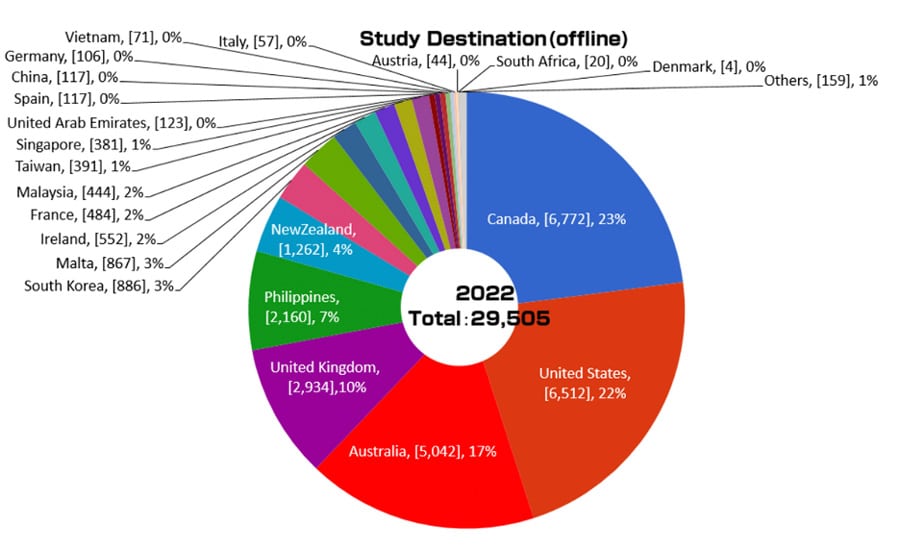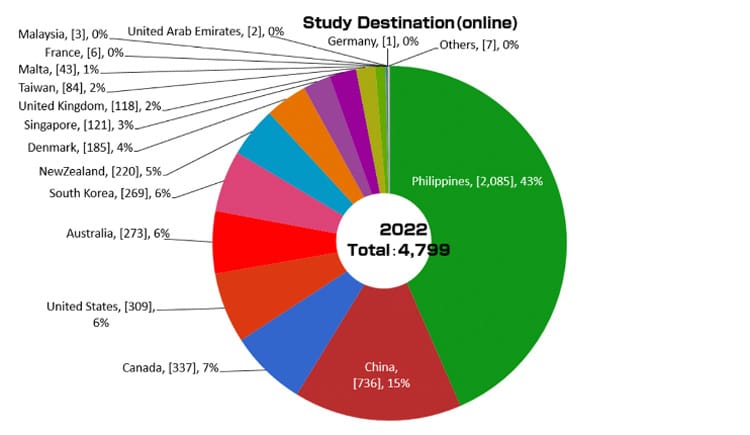Japanese students increasingly returning to study abroad
- An annual survey conducted by JAOS finds that outbound student mobility from Japan is recovering, but is still nowhere near what it was before the pandemic
- The proportion of Japanese students travelling for study abroad (as opposed to studying online from Japan) increased dramatically in 2022
- Canada is now at least as popular as the US for Japanese students, followed by Australia and the UK
- Alternative destinations are also on the radar
The Japan Association of Overseas Studies (JAOS) has released the results of its annual survey that takes the pulse of outbound mobility trends in Japan. The survey of 40 JAOS education agent members shows that outbound flows have rebounded since the pandemic but are still far off the volume achieved in 2019.
JAOS is made up of 64 organisations, including private education agents and overseas government agencies. Its mandate is to promote the healthy growth of study abroad businesses and study abroad programmes.
In 2022, JAOS agents report that 34,305 Japanese students (including those studying online) studied abroad in 2022. In 2019, the number was 78,000. The 34,000+ Japanese in study abroad programmes last year nonetheless represent a big jump from the roughly 15,000 who studied in online or face-to-face foreign programmes in 2021 (the second year of the pandemic). That year, only 6,100 Japanese went abroad, while nearly 9,000 stayed in Japan to study online.
Japanese students were much more likely in 2022 to choose face-to-face as opposed to online study abroad programmes. JAOS reports: “The survey found that conventional offline study abroad has increased by about five times over the previous year, while online study-abroad halved, clearly demonstrating the rebound trend for post Covid-19 recovery.” In 2022, 86% of all Japanese studying with foreign providers through JAOS agents/organisations travelled to study abroad.
JAOS notes that the Japanese government relaxing COVID protocols has helped to boost outbound mobility:
“The September 2022 removal of the requirement to submit proof of a negative PCR test upon returning to Japan has led to an increase students of both long-term and short-term study abroad programmes.”
Canada gains ground
Almost half of Japanese students who travelled for study abroad in 2022 chose Canada (23%) or the US (22%) as their destination. The next-most popular destinations were Australia (17%), the UK (10%), the Philippines (7%), and New Zealand (4%). 2022 is the first year that Canada attracted at least as many Japanese students as did the US.

Japanese students who opted to study online with a foreign institution were most likely to choose providers in the Philippines or China, as shown in the chart below.

Alternative destinations on the radar
JAOS says that UAE, South Korea, and Malaysia are becoming more popular among Japanese students:
“In 2022, three countries stood out as popular study abroad destinations. The first of these is the United Arab Emirates, specifically Dubai. The second is South Korea, which has garnered global attention in recent years due to the popularity of K-POP, K-dramas, and films. Next is Malaysia, an increasingly popular destination for overseas university education due to the relative increase in study abroad costs caused by the weakening of the yen and inflation in countries like the United States and Australia.”
JAOS predicts that alternative destinations such as Philippines, Malaysia, Taiwan, and Malta will gain increasing numbers of Japanese students given their greater affordability relative to Western destinations.
For additional background please see:
















